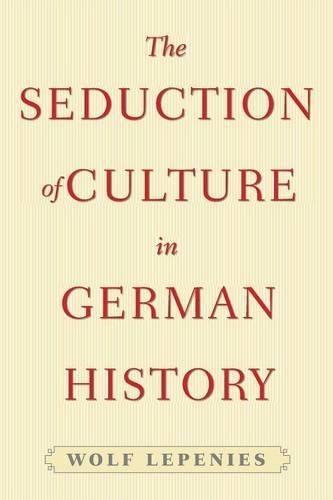
The Seduction of Culture in German History
(Paperback)
Publishing Details
The Seduction of Culture in German History
By (Author) Wolf Lepenies
Princeton University Press
Princeton University Press
2nd February 2015
United States
Classifications
General
Non Fiction
Political science and theory
Social and cultural history
European history
306.20943
Physical Properties
Paperback
272
Width 152mm, Height 235mm
397g
Description
During the Allied bombing of Germany, Hitler was more distressed by the loss of cultural treasures than by the leveling of homes. Remarkably, his propagandists broadcast this fact, convinced that it would reveal not his callousness but his sensitivity: the destruction had failed to crush his artist's spirit. It is impossible to begin to make sense
Reviews
"Lepenies's reflections on French-German and American-German culture wars suggest that cultural interpretation is as much a part of the social world as any social or political fact... [H]is history of an idea ... contains important political lessons for both Europe and the United States. The substitution of culture for politics is a dangerous road to travel."--Andreas Huyssen, The Nation "At times German cultural pride has become so obsessive that it's distorted the development of society. In an audacious new book, The Seduction of Culture in German History, ... Wolf Lepenies blames the catastrophes of 20th-century German politics on a tendency to overrate culture at the expense of politics."--Robert Fulford, National Post "The Seduction of Culture in German History, by Wolf Lepenies, offers fresh insights into the causes of the Nazi lunacy. Erudite and richly detailed, it traces the pathology of nationalist and cultural fixations, with implications for our own nervous and jingoistic age."--Peter Rose, The Australian "A highly thought-provoking ... series of 'history of ideas' vignettes. Lepenies traces the evolution of the Kulturnation, a nation united by culture rather than by political institutions, from the 18th century, when it emerged in the absence of a central German reunification in 1990... Lepenies concludes with a cautiously optimistic view of Germans' reconciliation of culture and politics... Highly recommended."--Choice "[Lepenies] gives a thorough treatment of the culture wars between France and Germany, emile Durkheim and Max Weber, the role culture played behind the Iron Curtain, and how the intellectuals triumphed over the communists throughout much of Eastern Europe but not in the German Democratic Republic ... Lepenies excels ... in his examination of German society and its embrace of culture while shunning politics."--Victorino Matus, First Things "A highly thought-provoking, if not contentious, series of 'history of ideas' vignettes. Lepenies traces the evolution of the Kulturnation, a nation united by culture rather than by political institutions, from the 18th century, when it emerged in the absence of a central German state, until German reunification in 1990... Lepenies concludes with a cautiously optimistic view of Germans' reconciliation of culture and politics... Highly recommended."--Choice "Wolf Lepenies, one of Germany's foremost public intellectuals, has written a fascinating and chilling essay on the seemingly unshakable German attitude of valuing culture over politics... [T]he role or cultural trends as powerful agents still needs to be seriously addressed. Lepenies's book does just this."--Anna B. Manchin, H-Net Review "[T]he eleven chapters/essays read most like a sophisticated and stimulating after-dinner conversation with much wit and many a dazzling insight and bon mot."--Diethelm Prowe, Historian "It is ... one of Lepenies' achievements to be able to combine irony and engagement... [T]here is a refreshing combination of restrained detachment with an unambiguous commitment to the ideal of a free society."--Beatrice Puja, European Legacy
Author Bio
Wolf Lepenies is one of Germany's foremost intellectuals. He served as Rector of the Wissenschaftskolleg, the German Institute for Advanced Study in Berlin (1986-2001), where he is now a Permanent Fellow. Lepenies is also Professor of Sociology at the Free University in Berlin, and he spent several years at the Institute for Advanced Study in Princeton. He is the author of numerous books and writes regularly for the German national newspaper Die Welt.
